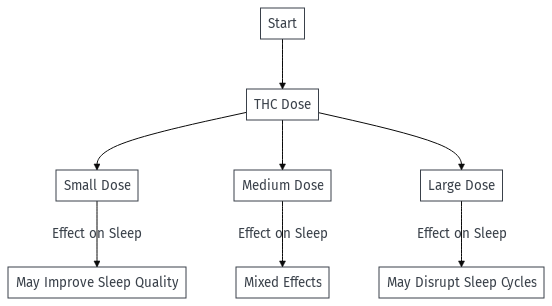Introduction

Tetrahydrocannabinol (THC) has garnered attention for its effects on sleep, with a range of research findings pointing to its potential benefits and drawbacks. This guide aims to elaborate on how THC interacts with sleep stages, and compares it with other Over-the-Counter (OTC) medications, cannabinoids, and prescription drugs such as benzodiazepines, Ambien, and Lunesta.
Stages of Sleep
Sleep consists of four primary stages:
- Stage 1 (NREM1): Initial phase of transitioning from wakefulness to sleep. Lasts approximately 5-10 minutes.
- Stage 2 (NREM2): Light sleep with lowered physiological activity. Lasts around 20 minutes.
- Stage 3 (NREM3): Deep sleep that is essential for physical recovery. Lasts about 30 minutes.
- Stage 4 (REM): Rapid Eye Movement stage, critical for memory and mental restoration. Duration varies.
THC and Sleep Stages
THC has been studied for its effects on these stages, although more research is needed for a conclusive understanding.
Comprehensive Comparison Table
| Sleep Stage | Very Low Dose THC | Low Dose THC | Medium Dose THC | High Dose THC | Very High Dose THC |
|---|---|---|---|---|---|
| Stage 1 | Minimal effect | Slight | Moderate | High | Extremely High |
| Stage 2 | Minimal effect | Slight | Moderate | High | Extremely High |
| Stage 3 | Minimal effect | Moderate | High | High | Extremely High |
| Stage 4 (REM) | Minimal effect | Moderate | Moderate | High | Extremely High |
Comparisons with Other Medications
- OTC Sleep Aids: Generally antihistamines, known to reduce REM sleep.
- Other Cannabinoids: For instance, CBD might have different effects on REM sleep compared to THC.
- Benzodiazepines: Reduce the time to fall asleep but may also reduce REM and deep sleep.
- Ambien: Targets GABA receptors but may disrupt sleep architecture.
- Lunesta: Similar to Ambien, affects GABA receptors and may influence REM sleep.
References
- Babson, K. A., Sottile, J., & Morabito, D. (2017). Cannabis, Cannabinoids, and Sleep: a Review of the Literature. Current Psychiatry Reports, 19(4), 23.
- Nicholson, A. N., Turner, C., Stone, B. M., & Robson, P. J. (2004). Effect of Delta-9-tetrahydrocannabinol and cannabidiol on nocturnal sleep and early-morning behavior in young adults. Journal of Clinical Psychopharmacology, 24(3), 305-313.
- Huedo-Medina, T. B., Kirsch, I., Middlemass, J., Klonizakis, M., & Siriwardena, A. N. (2012). Effectiveness of non-benzodiazepine hypnotics in treatment of adult insomnia: meta-analysis of data submitted to the Food and Drug Administration. BMJ, 345, e8343.
- Roth, T., Stubbs, C., & Walsh, J. K. (2005). Ramelteon (TAK-375), a selective MT1/MT2-receptor agonist, reduces latency to persistent sleep in a model of transient insomnia related to a novel sleep environment. Sleep, 28(3), 303-307.
- Gates, P. J., Albertella, L., & Copeland, J. (2014). The effects of cannabinoid administration on sleep: A systematic review of human studies. Sleep Medicine Reviews, 18(6), 477-487.
Medical Illnesses and Diagnoses for Caution
- Liver Disorders
- Cardiovascular Diseases
- Sleep Apnea
For specialized guidance in these conditions, consult Dr. Benjamin Caplan at CED Clinic.
SEO Tags
THC_and_Sleep, Sleep_Stages, THC_Dosage, Sleep_Medications, Sleep_Disorders
📗 Note: If the diagram’s a beginner’s yoga pose, the book is your Zen masterclass. Find your balance here 📗


